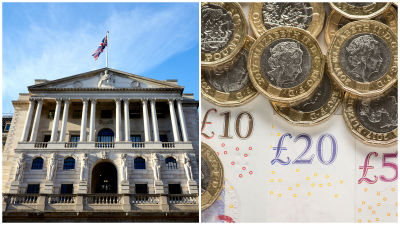Warning mortgage repayments could spike again as Bank of England interest rates rise expected

The Bank of England is expected to unveil the biggest interest rate rise since the 1980s on Thursday, as it tries to control the runaway inflation battering British households.
In a crunch meeting, the nine members of the Monetary Policy Committee will make a decision which could push up the amount that millions of mortgage holders have to pay their banks every month.
The consequential decision is expected to push up the Bank’s base interest rate from 2.25% to 3%, the highest since 2008.
Homeowners will be paying particular attention to any increase as mortgages are decided against this rate.
On Tuesday, it was announced that for the first time in 15 months house prices had dropped month-on-month.
The 0.9% fall was the greatest decrease since June 2020, according to figures released by Nationwide.
Should interest rates swell again, renters and buy-to-let investors could be strongly hit, with potentially serious impacts on the availability of homes to let, a committee of MPs has heard.
ITV News Business and Economics Editor Joel Hills analyses what changes the Bank of England could announce to interest rates
The Treasury Committee heard evidence about the potential impacts of rising mortgage costs for mortgage holders and renters.
Ray Boulger, senior mortgage technical manager at broker John Charcol said: “I think the buy-to-let market is where we’re likely to see a lot more stress than the residential market.
“When you factor in the other impact of energy price increases and cost of living increases that can have a significant impact on what people can borrow.”
Want a quick and expert briefing on the biggest news stories? Listen to our latest podcasts to find out What You Need To Know...
He added the stress rate is “particularly a problem on buy-to-let”.
If, as expected, the Bank raises interest rates by 0.75 percentage points, it would be the biggest single increase since 1989.
It will also be the eighth time in a row that the Bank hikes interest rates. Less than a year ago the rate was 0.1%.
Earlier this month, markets had predicted the interest rate increase could be as much as one percentage point, but that sentiment has calmed somewhat after the change of chancellor and prime minister.
Meanwhile, bond purchases by the Bank have pushed down on the cost of borrowing.
Markets have also witnessed a decreased appetite for large hikes globally, with the Bank of Canada increasing its interest rate by 0.5 percentage points - below the 0.75 percentage point rise which had been widely predicted.
Nevertheless, last month the Governor of the Bank, Andrew Bailey, said it was likely the hike in interest rates could be bigger than the 0.5 percentage point increase to 2.25% seen at the previous meeting.
He said on October 15: “As things stand today, my best guess is that inflationary pressures will require a stronger response than we perhaps thought in August.”
Analysts at Deutsche Bank have said they expect the Bank to opt for a 0.75 percentage point rise with a split vote.
Experts at the firm said they predict the latest forecasts from the Bank, which will also be revealed on Thursday, to show that “the economic outlook has deteriorated further”.
They added: “Conditioned on market pricing, the UK economy will likely fall into a deeper and more prolonged recession.”
In addition, the Bank will confirm its inflation expectations for the longer term, which are due to show that the cost of living will be much higher than the central bank’s 2% target next year.